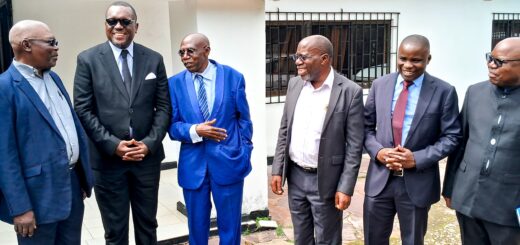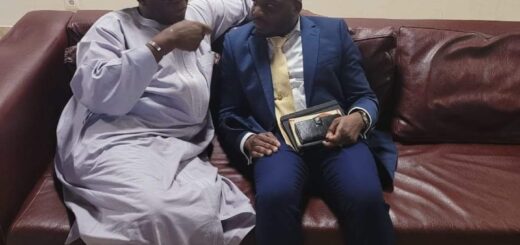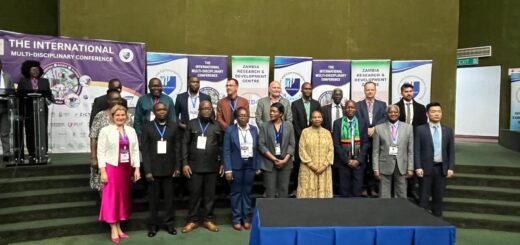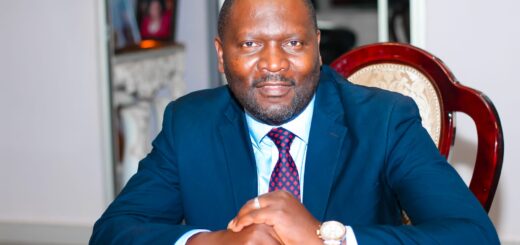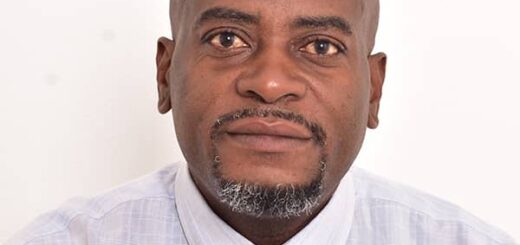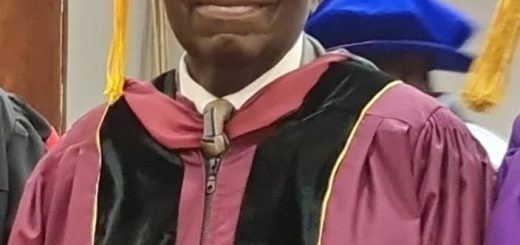Disability activist James Mwitwa petitions creation of Parley liaison committee
Notice: Undefined index: catFilterList in /home/zambi/public_html/wp-content/plugins/wp-likes/api.php on line 243
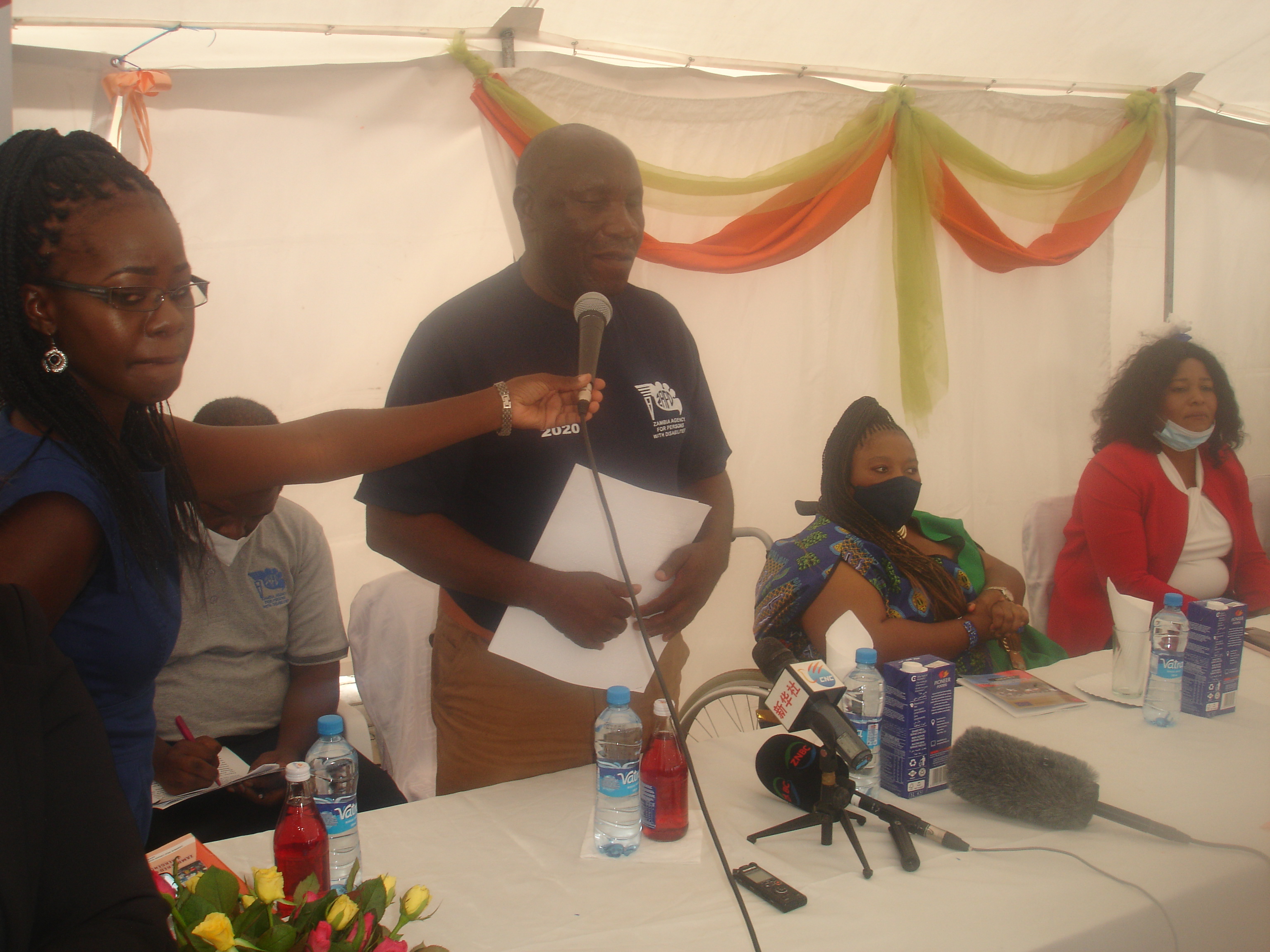
International Day for Persons with Disabilities Chairperson James Mwitwa assisted by ZNBC’s Linah Zulu at Kuku grounds Chawama Lusaka Thursday 3rd December 2020 pix Derrick Sinjela
By Derrick Sinjela
THE International Day for Persons with Disabilities (IDPD) organising committee chairperson James Mwitwa has commended the government for attaching great importance to issues affecting peers with a petition seeking creation of a liaison committee appointed by Clerk of the National Assembly, Cecelia Nsenduluka-Mbewe.
Reading a Thursday 3rd December 2020 braile speech at Kuku ground in Lusaka’s Chawama Constituency, during celebrations marking International Day for Persons with Disabilities, themed: “Building Back Better: toward a Disability inclusive, accessible and sustainable post COVID-19 Zambia,” Mr. Mwitwa told Community Development Minister Ms. Kampamba Mulenga-Chewe and her Permanent Secretary (PS) Pamela Kabamba to hasten care and support towards peers.
While lamenting over the flopped Bill 10 of 2020 which politicians peg as a springboard on which to empower vulnerable communities, Mwitwa asked Ms. Mulenga-Chewe and Ms. Kabamba to use bureaucracy as a means of increasing resources and policy incentives anchoring answers to teething challenges facing disabled persons.
Urged on to stress issues by peers, during a commemoration characterised by ululations and dancing, Mwitwa said persons with disabilities are that Government led by Dr. Edgar Chagwa Lungu and Veep Ms. Inonge Mutukwa-Wina is already supporting them as manifested in laws to protecting them.
“With this support, persons with disabilities can do anything to support their lives. I urge Government to honour promises made to the persons with disabilities in the 2030 agenda as ignoring previous pronouncements will result in peers being left behind. Persons with disabilities want to see the government introduce friendlier policies,” advised Mwitwa stressing a need to include Person with Disabilities on empowerment schemes and increasing access to academic and skilled education.
“We want the education provided to persons with disabilities be delivered in an appropriate language and mode that is easy to understand. The health care programmes must embrace and include education on disabilities issues and provide periodic screening to easily detect and invariably prevent disabilities. Zambia’s curriculum must include an elaborate study of disabilities,” advised Mwitwa during a commemoration moderated by Linah Zulu.
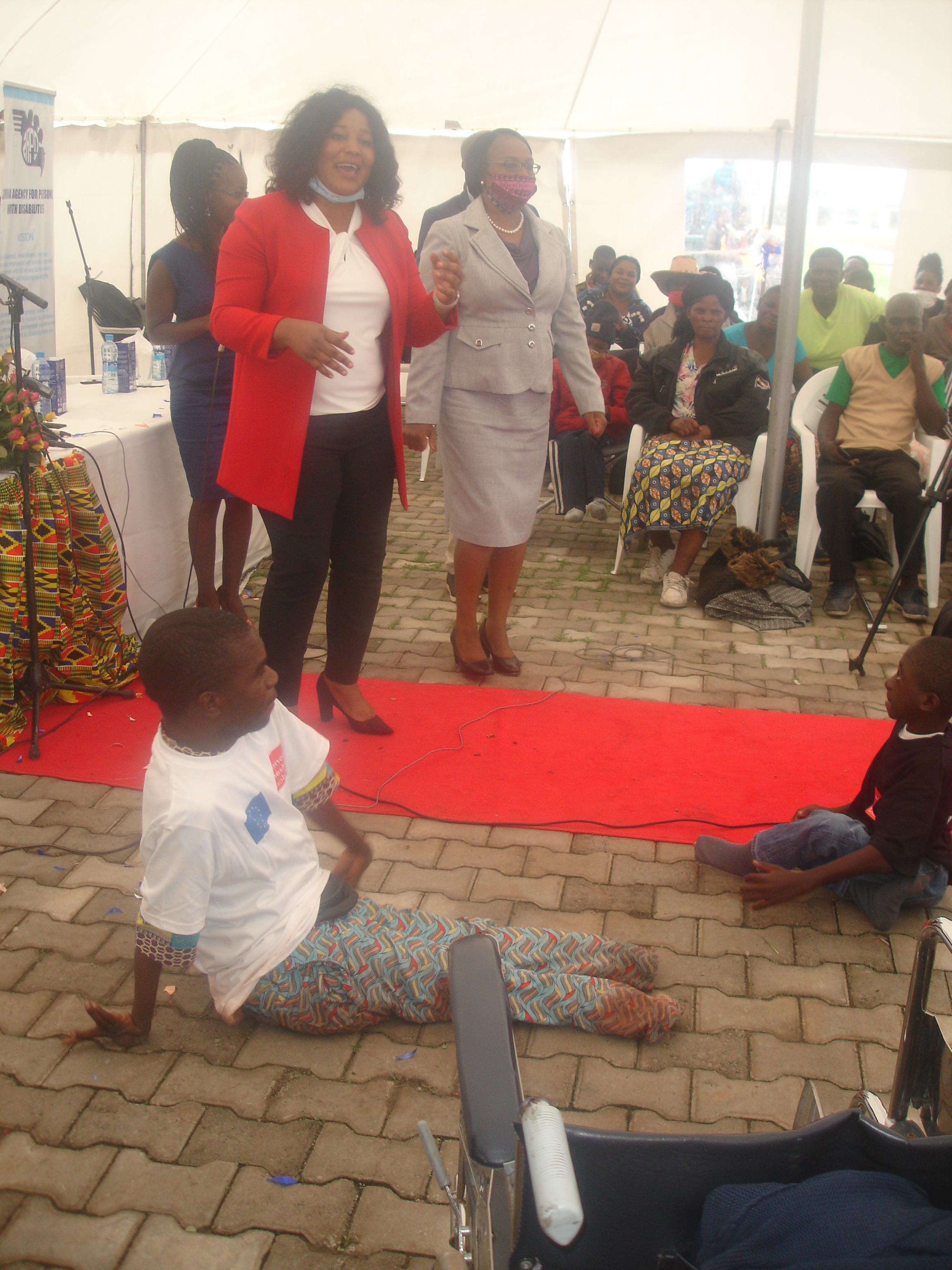
ZNBC’s Linah Zulu, Community Development Minister Kampamba Mulenga Chewe and PS Pamela Kabamba at IPDP Chawama’s Kuku grounds in Lusaka on Thursday 3rd December 2020 – PICTURE by Derrick Sinjela
However, Mwitwa commended Finance Minister Dr. Bwalya Kanyanta Emmanuel Ng’andu for increasing the amount of money allocated to the persons with disabilities but prayed that the former Bank of Zambia (BoZ) Deputy Governor Operations will facilitate exempt duty on peers, stressing that such property is not a luxury but a necessity.
“I propose that the person parliament appoints disabilities liaison committee help us understand bill’s presented to parliament. The leader of the liaison committee tasked with coordinating interests of persons with disabilities must work under the Clerk of the National Assembly and be paid by the legislature with committee members working on the voluntary basis. If the persons with disabilities cannot go to parliament politically, then we can go to parliament bureaucratically,” proposed Mwitwa.
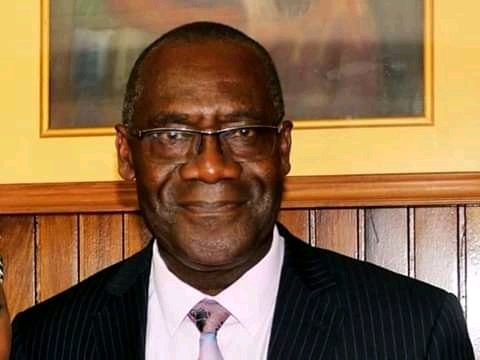
Finance Minister Dr BWALYA KANTANTA EMMANUEL NG’ANDU has announced that the International Monetary Fund will conduct a VIRTUAL consultative and information exchange mission for Zambia from 22nd June 2020 to 1st July, 2020.
In response Community Development Minister, Ms. Mulenga-Chewe observed that person with disabilities face a number of barriers that prevent them from enjoying the public services; education, health to mention but two challenges.
Moments after touring an exhibition, Mulenga-Chewe told person with disabilities that as a matter of urgency the government will come up with a formidable formular to protect their inalienable rights as citizens.
Ms. Mulenga-Chewe noted the negative impact on global communities since the December 2019 outbreak of COVID-19 pandemic, on the progressive enjoyment of privileges and capacity to keep risk exposure to the virus at bay.
“Covid 19 has resulted in Persons with disabilities becoming more vulnerable to COVID-19. I regret barriers preventing them from accessing the services, and I believe that surveillance methods will detect problems facing peers.
Kampamba-Chewe, a Patriotic Front (PF) Kalulushi Member of Parliament (MP) on Zambia’s Copperbelt Province expressed a need for person with disabilities being given adequate education to effectively cope with their environment.
“By not allowing persons with disabilities to participate in classwork, community and in Church activities is a subtle form of segregation denying PWD’s inalienable entitlements. The collapse of Bill 10 made sad reading as this constitutional change would have enabled persons with disabilities to speak for themselves on issues, but despite the depressing development our Government will not abandon persons with disabilities,” vowed Mulenga-Chewe.
Mulenga-Chewe urged persons with disabilities to speak with one voice despite representing a variety of disability interest groups.
“Our ministry will receive your petition and deliver it to the Clerk of the National Assembly and see how the government will respond to your proposal,” pledged Mulenga-Chewe.
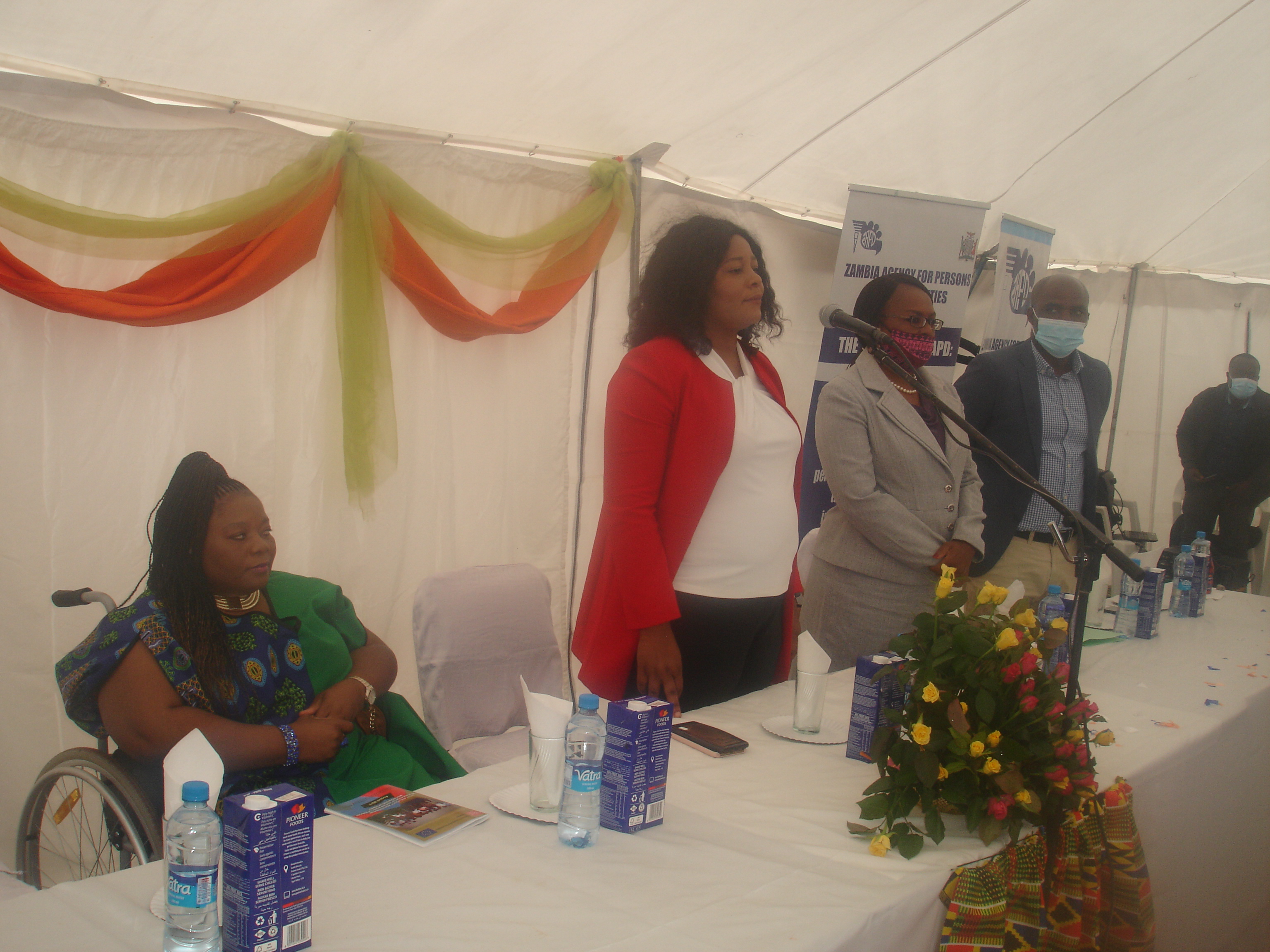
ZAPcting Director General Julien Mwape with Community Dev Minister Kampamba Mulenga Chewe and PS Pamela Kabamba at IPDP Chawama’s Kuku grounds in Lusaka Thursday 3 Dec 2020 Derrick Sinjela

Governing body – The Board
As prescribed in the Persons with Disability Act, the Board is made up of 18 members. The current Board consists of eight representatives of whom four are women, of the following categories of disabilities: mental disability; visual impairment; physical disability and hearing impairment. It also then has a representative from the Federation of Employers, representatives from the following ministries, the Ministry responsible for works and buildings, Education Science and Technology, Community Development and Social Welfare, Finance, Broadcasting services, Labour, Health; a representative from the Attorney General’s office and a representative from a youth disability organisation.
The Organisational structure
The organisational structure is such that at the helm of the Agency is the Director General under whom fall three Directorates, headed by the Director of Planning & Programmes, Director of Rehabilitation and Research and the Director of Administration and Finance.
About Us
WELCOME TO ZAMBIA AGENCY FOR PERSONS WITH DISABILITIES WEBSITE
The Zambia Agency for Persons with Disabilities is a quasi-Government Institution established by an Act of Parliament, the Persons with Disabilities Act No. 06 of 2012 of the Laws of Zambia.
ZAPD is a statutory body established under the persons with disabilities act number 6 of 2012 cap 65 of the laws of zambia. The agency falls under the Ministry of Community Development and Social Welfare.
Vision
A fully rehabilitated or rehabilitated, enlightened, economically empowered and socially integrated disabled persons with full access to information / public facilities e.t.c. and enjoying equal rights with other members of the society.






